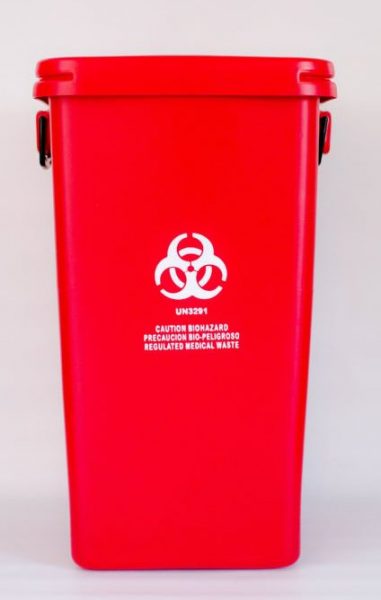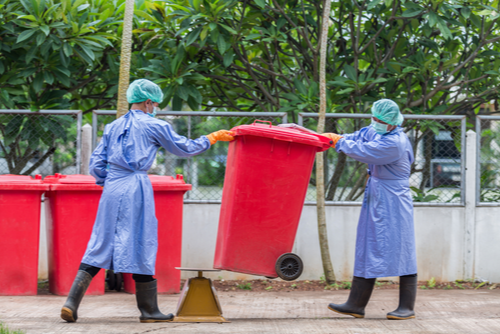Guardians of Sanitation: Citizen Medical Waste Removal Service for Your Peace of Mind
Guardians of Sanitation: Citizen Medical Waste Removal Service for Your Peace of Mind
Blog Article
Keep Ahead of Rules: Expert Guidance on Medical Garbage Disposal
In a globe where the healthcare sector is frequently advancing, it is essential for medical centers to remain ahead of guidelines when it comes to the correct disposal of clinical waste. From recognizing the different groups of medical waste to implementing the right collection and segregation methods, this discussion will supply actionable suggestions and beneficial understandings to aid centers stay in advance of laws in the ever-changing landscape of clinical waste disposal.
Comprehending Clinical Waste Categories
Recognizing medical waste groups is vital for proper disposal and management in health care facilities. Clinical waste describes any type of waste created by health care tasks that may present a threat to public health and wellness or the environment. It is vital to categorize medical waste properly to ensure its risk-free handling, transport, treatment, and disposal.
There are a number of groups of medical waste that health care centers require to be knowledgeable about. The most usual classifications include transmittable waste, pathological waste, sharps waste, pharmaceutical waste, and chemical waste. Each category has specific guidelines and guidelines for its correct management and disposal.
Pathological waste refers to human cells, body organs, or body components that need unique handling and disposal. Pharmaceutical waste comprises expired, extra, or infected medicines that require cautious handling and disposal.
Staying Up-To-Date With Regulatory Changes
Staying existing with governing modifications is crucial for medical care centers to make certain conformity and appropriate monitoring of clinical garbage disposal. medical waste removal services. With regulations constantly advancing, it is crucial for medical care facilities to remain updated to avoid fines, fines, and potential injury to the atmosphere and public health
To remain ahead of regulatory adjustments, health care facilities should establish a system for surveillance and tracking updates. This can be done by signing up for regulative newsletters, attending workshops and conferences, and proactively joining industry associations. In addition, facilities must designate an employee or group accountable for remaining informed and sharing information to appropriate stakeholders.
Normal communication with governing agencies is additionally important. Health care facilities ought to develop connections with neighborhood, state, and federal companies to guarantee they recognize any type of changes in guidelines that might impact their waste administration methods. This can be done via regular meetings, engagement in public comment periods, and proactive involvement with regulative firms.
In addition, health care centers ought to consider partnering with waste monitoring firms that focus on clinical waste disposal (medical waste disposal services with WasteX). These business are usually well-versed in the most recent guidelines and can offer advice and assistance to guarantee conformity
Implementing Appropriate Collection and Segregation Methods
To effectively manage medical waste disposal, health care facilities need to establish appropriate collection and segregation techniques according to governing standards. Implementing these approaches ensures the safe handling and disposal of potentially hazardous materials, protects the setting, and decreases the threat of injuries and infections to medical care employees and the public.
Correct collection and partition techniques involve making use of designated containers and classifying systems. Medical care centers ought to offer clearly labeled containers for various kinds of medical waste, such as sharps, infectious waste, pharmaceutical waste, and non-hazardous waste. These containers should be color-coded and plainly significant to prevent confusion and promote easy recognition.
In addition, health care centers need to educate their team on the proper treatments for collecting and segregating medical waste. This includes educating them on the various sorts of waste, the suitable containers to use, and the relevance of adhering to regulations and standards. Routine training sessions and refresher training courses need to be performed to guarantee that employee remain current on ideal practices.
Furthermore, health care facilities must establish a system for routine collection and disposal of medical waste. This might involve partnering with licensed waste administration companies that concentrate on medical garbage disposal. These companies will certainly ensure that the gathered waste is transported and taken care of in compliance with regulative requirements.
Selecting the Right Disposal Approaches

Incineration is one of the most effective and typical techniques for taking care of particular sorts of clinical waste, such as pathological waste and sharps. It entails the regulated burning of waste at high temperature levels, lowering it to ash. However, incineration can launch damaging contaminants into the air and contribute to air pollution.

Other disposal techniques include chemical therapy, microwave treatment, and landfilling. Chemical therapy involves the usage of chemicals to sanitize and neutralize the waste. Microwave therapy uses microwave power to heat and disinfect the waste. Landfilling includes burying the waste in a marked land fill area (medical waste disposal services with WasteX). Nevertheless, landfilling needs to be the last hope due to the prospective danger of contamination to dirt and groundwater.
Guaranteeing Compliance With Paperwork and Training
After very carefully taking into consideration the ideal disposal approaches for clinical waste, medical care centers have to make certain conformity with laws and minimize environmental impact by implementing effective documents and training treatments. This action is critical in maintaining a lasting and secure setting for both medical care employees and the public.

Training is just as crucial in making certain compliance with laws. Healthcare workers that take care of medical waste ought to get ideal training on waste segregation, dealing with, and disposal treatments. This training needs to cover subjects such as the proper use of personal protective devices, recognition of various kinds of waste, and the appropriate disposal techniques for each and every waste category. By offering detailed training, medical care centers can empower their staff to make informed decisions and decrease the threat of inappropriate waste disposal.
Final Thought
In final thought, staying in advance of laws in clinical garbage disposal is important for health care facilities. medical use this link waste removal. Understanding the various categories of clinical waste, remaining upgraded with regulative changes, executing proper collection and partition approaches, selecting the proper disposal methods, and ensuring conformity with documents and training are all necessary steps. By following these standards, healthcare companies can successfully manage and get rid of of medical waste in a responsible and secure way
From recognizing the different groups of clinical waste to executing the ideal collection and segregation methods, this conversation will give useful understandings and actionable pointers to help centers stay ahead of laws in the ever-changing landscape of medical waste disposal. - medical waste disposal services with WasteX
The most typical groups consist of transmittable waste, pathological waste, sharps waste, pharmaceutical waste, and chemical waste. Healthcare facilities ought to offer clearly identified containers for various kinds of clinical waste, such as sharps, transmittable waste, pharmaceutical waste, and non-hazardous waste. Medical care centers need to develop a comprehensive system to record and track all aspects of medical waste disposal, including types of waste generated, quantities, and disposal techniques made use of. Medical care employees that manage clinical waste must get proper training on waste segregation, managing, and disposal procedures.
Report this page